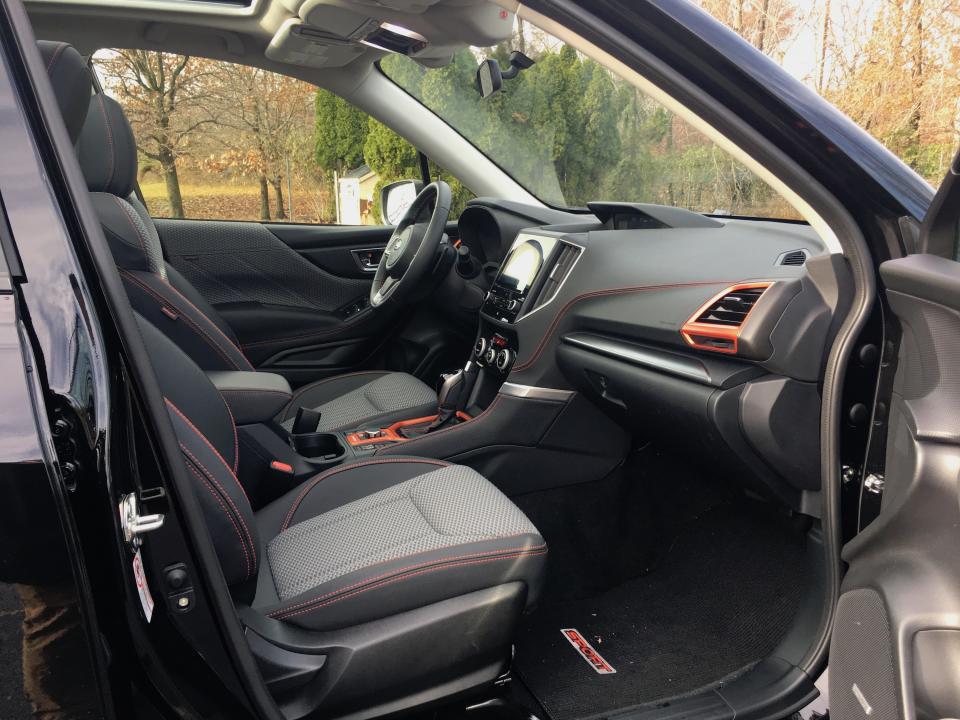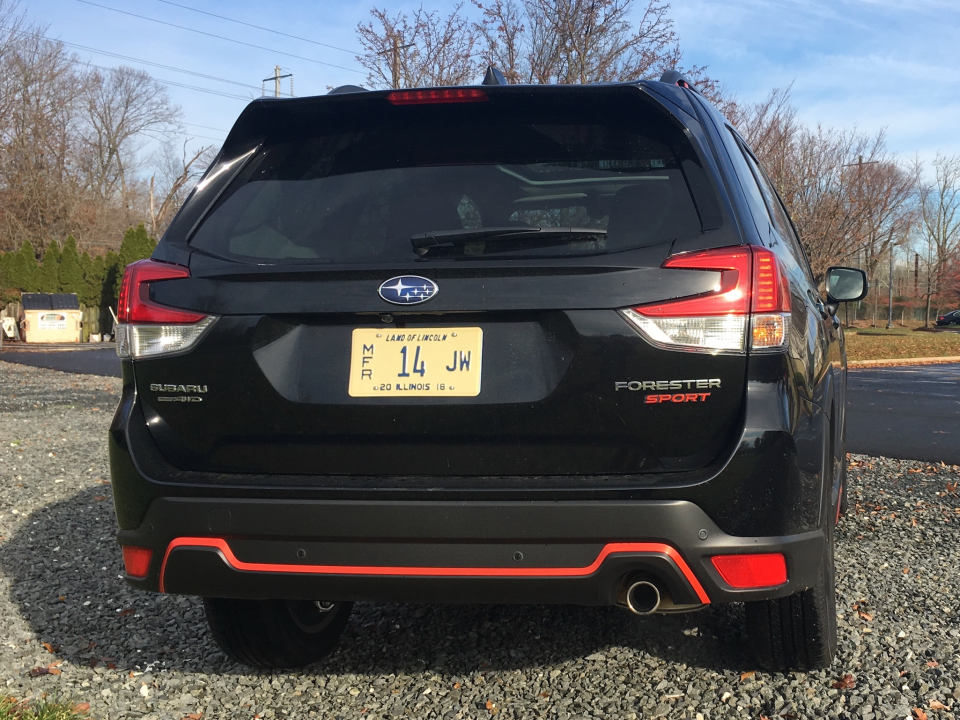We drove a $32,000 Subaru Forester and a $35,000 Mazda CX-5 to see which one is the better compact SUV. Here's the verdict
The Subaru Forester and Mazda CX-5 are two of the most the capable crossover SUVs in the US.
The Toyota RAV4, Honda CRV, and Nissan Rogue lead the sales chart, but the CX-5 and Forester remain two highly popular alternatives.
The 2018 Mazda CX-5 starts at $US24,150, while the top-spec all-wheel-drive Grand Touring model starts at $US30,945.
The base 2019 Subaru Forester starts at $US24,295, while the top-of-the-line Touring starts at $US34,295. Our mid-grade Sport trim test car starts at $US28,795.
The Forester's good infotainment system, standard all-wheel-drive, and an impressive suite of standard safety tech won out over the CX-5's stylish design and strong driving dynamics.
Compact crossovers are the hottest thing going these days. According to data compiled by Kelley Blue Book, compact crossovers and SUVs account for roughly one in every five cars sold this year.
The Toyota RAV4, Honda CR-V, and Nissan Rogue lead the way in sales and account for more than 35% of the segment. Over the first 11 months of 2018, the trio accounted for roughly one million cars sold just in the US.
Not far behind is the second tier of contenders led by industry heavyweights likes the Subaru Forester and Mazda CX-5.
The second-generation Mazda CX-5 debuted for the 2017 model year and has been popular with both critics and customers. In fact, CX-5 sales through November are up more than 20% over 2017.
Subaru is back with a new fifth-generation Forester for the 2019 model year. During its first full month on the market in October, the 2019 model pushed Forester sales up 19% over the previous year.
This year, Business Insider had the chance to experience a 2018 Mazda CX-5 in top-spec Grand Touring trim and a 2019 Subaru Forester in mid-grade Sport trim.
Recently, the 2018 Mazda CX-5 beat out the 2018 Volkswagen Tiguan in a comparison. But how will the Mazda stack up against the Subaru Forester?
Let's take a closer look.
First up is the Mazda CX-5.
The 2018 Mazda CX-5 comes in three flavours: Sport, Touring, and Grand Touring.
The base front-wheel-drive CX-5 Sport starts at $US24,150, while the mid-grade Touring model starts at $US26,215. The top-of-the-line Grand Touring starts at $US29,645. All-wheel-drive is available on all three trim levels as a $US1,300 option.
Our 2018 Mazda CX-5 Grand Tour AWD started at $US30,945. With options and fees, our CX-5 carried an as-tested-price of $US34,685.
For 2019, Mazda will add Grand Touring Reserve and Signature trims levels to the top end of the CX-5 lineup.
The CX-5 features Mazda's signature Kodo design language, which aims to deliver a timelessly elegant look while conveying the spirit of Japanese craftsmanship. The result is a CX-5 that is both striking and memorable without being over the top.
The rounded rear end is decidedly in contrast to the angular headlights and front grille.
The Mazda CX-5 is 179.1 inches long and 65.3 inches tall.
The CX-5's interior really impresses. It's stylish yet boasts stellar ergonomics. Material quality is close to what you would find in a premium-badged vehicle.
I found the white leather-trim seats in our test car to be well bolstered and comfortable, with good adjustability.
The rear cabin is roomy, with adequate space for two adults. The center seat is more geared toward children. The CX-5's 39.6 inches of rear legroom may be a bit tight for taller folks.
On the road, the cabin is quiet and refined. Extra sound deadening fixes one of the biggest complaints about its predecessor, which had one of the louder cabins in the segment.
The centrepiece of the front dash is a 7-inch touchscreen running the company's homegrown Mazda Connect infotainment system.
The system, which can also be controlled using a rotary dial mounted in the center console, features a simple and straightforward layout.
Its user interface leaves much to be desired. For example, it took to some hunting before we figured out how to cancel a route on the navigation system.
And unfortunately, Apple CarPlay and Android Auto are not available on 2018 CX-5s but will be standard on all 2019 CX-5s other than the base Sport trim.
It's not as crisp as premium systems found in luxury brands, but it looks on par with most mass-market units.
Overall, the CX-5 Grand Touring came equipped with a healthy complement of tech goodies, including a head-up display, adaptive cruise control, a rear camera, lane-keep assist, "smart city brake support," rear cross-traffic alert, and a 10-speaker Bose sound system.
Lift the single-piece tailgate, and you'll find a solid 30.9 cubic feet of cargo room. Fold down the 40/20/40-split bench, and that expands to 59.6 cubic inches.
Under the hood is a 2.5-litre, 187-horsepower, naturally aspirated four-cylinder engine. It uses Mazda's lean burning, high-compression SkyActiv technology to increase fuel economy and improve emissions. It's hooked up to a smooth-shifting six-speed automatic and all-wheel drive. According to Mazda, the all-wheel-drive CX-5 is good for 24 mpg city/30 highway.
What's it like to drive?
Driving dynamics is the CX-5's forte.
"The Mazda CX-5 is a joy to drive," we said in our review. "The SkyActiv four-cylinder meshes perfectly with the six-speed automatic. It's perky off the line and delivers more than adequate power around town."
However, the CX-5's powertrain wasn't without fault - since it functions without the additional torque provided by a turbocharger, the Mazda struggles a bit under hard acceleration. The transmission is generally very quick to "drop down" a couple of gears to get the engine back into the heart of its power band.
Mazda will address our complaint about engine power in 2019 by making 250 horsepower turbocharged engine available on Grand Touring Reserve and Signature trim levels.
As far as handling goes, the CX-5 is quite impressive. The chassis is well balanced, while the steering is crisp, with good feel.
"Overall, the CX-5's suspension, chassis, and steering are beautifully tuned," our review said. "As a result, you get a crossover SUV that's both confident in the corners and comfortable cruising down the highway."
Next up is the Subaru Forester.
The 2019 Subaru Forester comes in five trim levels: base, Premium, Sport, Limited, and Touring.
The base Forester starts at $US24,295 while the top-of-the-line Touring starts at $US34,295. Our mid-grade Sport trim test car starts at $US28,795. With options and fees, our Forester came to an as-tested price of $US31,815.
The new fifth generation Forester debuted for the 2019 model. Its all-new and built on the Subaru Global Platform that also underpins the Crosstrek and the Impreza.
Aesthetically though, you'd be hard-pressed to spot the difference between the new model and its outgoing predecessor. In other words, it's undeniably a Subaru. Overall, the styling is restrained and handsome.
At 182.1 inches long with a 105.1-inch wheelbase, the 2019 Forester is about an inch longer than the outgoing model. This translates into a slightly more roomy interior.
Speaking of the interior, it's rather impressive. While the Forester Sport's cabin isn't exactly stylish or plush, it's very roomy and well-designed. Cabin ergonomics and button placement are on point.
The cabin feels solidly put together while material quality is impressively high. Everything about this interior gives you the impression that it's built to last.
I'm not in love with the Sport trim's orange accents. They feel a bit tacky.
The Forester interior in Touring trim is considerably plusher.
In front of the driver is a leather-wrapped steering wheel. It's packed with the various button needed to operate everything from the drive mode selector to the adaptive cruise control. Fortunately, the buttons are clearly labelled and the controls are intuitive to use. There's also digital information display flanked by a traditional analogue gauge cluster
The Forester's center console features not one, but two infotainment screens. It's the same setup found in both the Crosstek and the Ascent.
Our test car came equipped with the optional eight-inch touchscreen running Subaru's Starlink infotainment system. Forester's come equipped with a 6.5-inch unit.
We were impressed with Starlink's simple, straightforward layout as well as its high feature content.
Features include Apple CarPlay, Android Auto, and Pandora App integration
The secondary display, which is controlled using the "Info" button on the steering wheel, is just as useful. It offers readouts of the vehicles trip computer, climate control, ...
... Radio, ...
... As well as any active safety systems.
Subaru's EyeSight drivers assistance system comes standard on all Foresters. Eyesight is made up of a collection of technology including adaptive cruise control, automatic pre-collision braking, lane-departure warning, lane-keep assist, and pre-collision throttle management. The system, which works through a pair of cameras located on either side of the rear-view mirror, worked brilliantly and is a true asset to Subaru.
The second row is particularly impressive with ample head and legroom for even the taller among us. The rear seats now have 39.4 inches of legroom, up 1.4 inches from the outgoing model.
Overall, the Subie's cabin feels roomy, airy, and inviting. It's helped by the panoramic sunroof that comes standard on all Foresters except the base model.
Open the power rear hatch and...
... You'll find 33 cubic feet of cargo space with the seats up. Fold the second row down and cargo capacity increases to a voluminous 70.9 cubic feet.
Power for the new Forester comes from an updated version of Subaru's trusty 2.5-litre, boxer-four-cylinder engine. The naturally aspirated powerplant produces 182 horsepower, up 12 horsepower from the outgoing model. It's hooked up to a continuously variable transmission ...
... That sends power to Subaru's standard Symmetrical All-Wheel-Drive system. The Forester's AWD system can operate in several modes including dirt, snow, and mud.
So, what's it like to drive?
The Forester is slow and a bit underpowered, but quite pleasant in every other regard.
The issue centres on the fact that the naturally aspirated four-cylinder engine simply doesn't have enough power to haul around the 3,400-pound SUV, its passengers, and all of their stuff.
"The Forester struggled mightily on highway on-ramps. The CVT worked hard to keep the engine in the meatiest part of its powerband, but it could only do so much," we said in our review. "We did eventually find some speed, but it took a while. The powertrain just didn't feel eager to perform, even in Sport mode."
Apart from the lack of power, the Forester performed very well. Its handling was quick and nimble, but a tad on the numb side. The suspension delivered a smooth and comfortable ride.
Our verdict.
The winner is the 2019 Subaru Forester.
Both crossovers proved themselves to be highly capable and well executed.
Both offer a comfortable ride and well-designed interior.
Finally, both the Mazda and the Subaru feel underpowered and could do with the extra torque on offer with the addition of a turbocharger.
The Mazda CX-5's sleek looks and beautifully finished interior certainly impressed. In addition, the Mazda is hands down the best driving compact crossover on the market.
At the same time, the 2019 Forester really wowed us with its solid feel, an impressive suite of standard drivers assistance tech, standard all-wheel-drive, comfortable cabin, and a superior infotainment system.
Really, it was the superior infotainment system and standard safety tech that put the Forester over the top.
So, a big and well-deserved congratulations to the 2019 Subaru Forester.
But with the updated 2019 Mazda CX-5 on the way, this duo is ripe for a rematch.

 Yahoo Finance
Yahoo Finance 








































